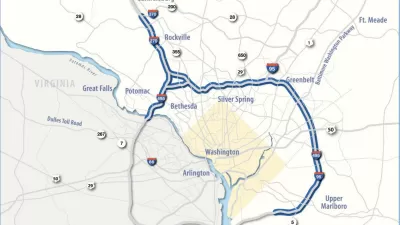A local writer compares the plan to expand I-270 and the Capital Beltway to an earlier era of transportation planning.
Joe Allen reports on an underappreciated consequence of Maryland's plans to expand and add express lanes along I-270 and the Capital Beltway.
"The transportation merits of this project, the public/private construction, and bid process have been controversial, but a tremendous impact that has not received attention is the potential significant displacement of low-income residents along its path," writes Allen.
"Similar to highway projects in the era of Robert Moses, this proposal would displace hundreds of low-income families and knock down affordable homes closest to the region’s job centers. At the same time, even those who don’t lose their house will lack access to the Express Toll Lanes (ETLs), as many of the interchanges in Montgomery County do not have right of way to build separate entrances to the ETL.
Allen digs into the specifics of the difficult-to-acquire 2009 Environmental Impact Study (which he found through public meeting records, not the Maryland Department of Transportation's US15/I270 Multimodal Study website). This is in depth reporting and critiquing of very consequential highway planning project.
Planetizen reported on Maryland Governor Larry Hogan's relatively recent push to widen add express lanes to the Capital Beltway and I-270 in September 2017 and January 2018.
FULL STORY: Widening I-270 could demolish hundreds of homes and affordable homes

Maui's Vacation Rental Debate Turns Ugly
Verbal attacks, misinformation campaigns and fistfights plague a high-stakes debate to convert thousands of vacation rentals into long-term housing.

Planetizen Federal Action Tracker
A weekly monitor of how Trump’s orders and actions are impacting planners and planning in America.

In Urban Planning, AI Prompting Could be the New Design Thinking
Creativity has long been key to great urban design. What if we see AI as our new creative partner?

How Trump's HUD Budget Proposal Would Harm Homelessness Response
Experts say the change to the HUD budget would make it more difficult to identify people who are homeless and connect them with services, and to prevent homelessness.

The Vast Potential of the Right-of-Way
One writer argues that the space between two building faces is the most important element of the built environment.

Florida Seniors Face Rising Homelessness Risk
High housing costs are pushing more seniors, many of them on a fixed income, into homelessness.
Urban Design for Planners 1: Software Tools
This six-course series explores essential urban design concepts using open source software and equips planners with the tools they need to participate fully in the urban design process.
Planning for Universal Design
Learn the tools for implementing Universal Design in planning regulations.
Gallatin County Department of Planning & Community Development
Heyer Gruel & Associates PA
JM Goldson LLC
City of Camden Redevelopment Agency
City of Astoria
Transportation Research & Education Center (TREC) at Portland State University
Jefferson Parish Government
Camden Redevelopment Agency
City of Claremont




























